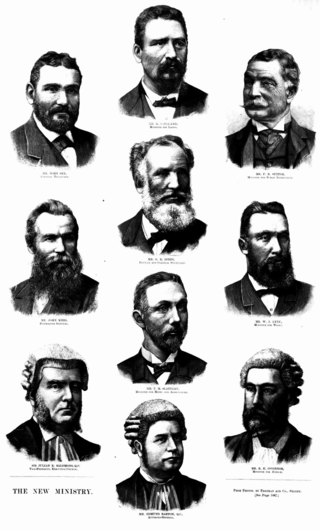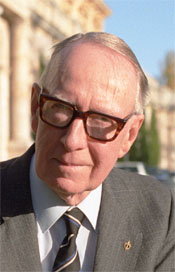Related Research Articles

Sir Charles Walter Michael Court, was a Western Australian politician, and the 21st Premier of Western Australia from 1974 to 1982. He was a member of the Liberal Party.

Raymond James O'Connor was an Australian politician who served as the premier of Western Australia from 25 January 1982 to 25 February 1983. He was a member of parliament from 1959 to 1984, and a minister in the governments of David Brand and Charles Court. O'Connor was born in Perth and attended schools in the Wheatbelt towns of Narrogin and York as well as St Patrick's Boys' School in Perth, leaving school at the age of 14. He played athletics and Australian rules football as a teenager and young adult, including playing 14 matches for East Perth in the Western Australian National Football League. During World War II, he served in the Australian Imperial Force in New Britain and Bougainville.
The Barnett Ministry was the 35th Ministry of the Government of Western Australia. It included 13 members of the Liberal Party, three members of the National Party and an independent. It was led by the Premier of Western Australia, Colin Barnett, and Deputy Premier Liza Harvey. It succeeded the Carpenter Ministry on 23 September 2008 following the 2008 election and was succeeded by the First McGowan Ministry following the Liberal Party's defeat at the 2017 election.
The Lawrence Ministry was the 31st Ministry of the Government of Western Australia, and was led by Labor Premier Dr Carmen Lawrence and her deputy Ian Taylor. It succeeded the Dowding Ministry on 18 February 1990, following the resignation of Peter Dowding six days earlier following an open letter signed by a majority of the 47-member Labor caucus. The ministry was in turn succeeded by the Court–Cowan Ministry on 16 February 1993 after the Labor Party lost government at the state election held on 6 February.
The Court–Cowan Ministry was the 32nd Ministry of the Government of Western Australia, and was led by Liberal Premier Richard Court and his deputy, the Nationals' Hendy Cowan. It succeeded the Lawrence Ministry on 16 February 1993, following the defeat of the Labor government at the 1993 election ten days earlier. The Ministry was reconstituted on 9 January 1997 following the December 1996 election, due in part to the retirement and resignation of several ministers—Richard Lewis, Kevin Minson, Roger Nicholls and Bob Wiese. The ministry was followed by the Gallop Ministry on 16 February 2001 after the Coalition lost government at the state election held on 16 February.
The Court–McPharlin Ministry was the 26th Ministry of the Government of Western Australia, and was led by Liberal Premier Sir Charles Court and his deputy, National Country Party leader Ray McPharlin. It succeeded the Tonkin ministry on 8 April 1974, following the defeat of the Labor government at the 1974 election nine days earlier. The Ministry collapsed when McPharlin led the National Country Party out of the Coalition on 20 May 1975, and was reconstituted on 5 June 1975 as the Court Ministry.
The Court Ministry was the 27th Ministry of the Government of Western Australia, led by Liberal Premier Sir Charles Court and deputy Des O'Neil. It commenced on 5 June 1975, following the Court–McPharlin Ministry, 15 months after the Coalition's electoral defeat of the Tonkin Labor government. It was followed by the O'Connor Ministry upon Court's retirement as Premier on 25 January 1982.
The Burke Ministry was the 29th Ministry of the Government of Western Australia, led by Labor Premier Brian Burke and deputy Mal Bryce. It commenced on 25 February 1983, six days after the O'Connor ministry, led by Premier Ray O'Connor of the Liberal Party, was defeated at the 1983 election. It was followed by the Dowding Ministry upon Burke's retirement as Premier on 25 February 1988.
The Tonkin Ministry was the 25th Ministry of the Government of Western Australia, led by Labor Premier John Tonkin and deputy Herb Graham. It commenced on 3 March 1971, eleven days after the Brand–Nalder Ministry, led by Premier David Brand of the Liberal Party, was defeated at the 1971 election. The ministry was followed by the Court–McPharlin Ministry on 8 April 1974 after the Labor Party lost government at the state election held on 31 March.
The Brand–Nalder Ministry was the 24th Ministry of the Government of Western Australia, led by Liberal Premier David Brand and his deputy, Country Party leader Crawford Nalder. It succeeded the Brand–Watts Ministry on 1 February 1962 following the Deputy Premier's retirement from politics. The ministry was followed by the Tonkin Ministry on 3 March 1971 after the Coalition lost government at the state election held on 23 February.

The third Dibbs ministry, the 27th ministry of the Colony of New South Wales, was led by Sir George Dibbs, leader of the Protectionist Party, following the 1891 New South Wales election, which saw the Labour Party win seats in the New South Wales Legislative Assembly and the balance of power. With no party having a majority, Sir Henry Parkes held on as Premier until October 1891 when he lost a vote in the Legislative Assembly, causing Parkes to resign as Premier and leader of the Free Trade Party. Dibbs formed the ministry on 23 October 1891, with Labour support, and comprised 10 ministers.
Margaret June Craig AM is a former Australian politician who was a Liberal Party member of the Legislative Assembly of Western Australia from 1974 to 1983, representing the seat of Wellington. She was a minister in the governments of Sir Charles Court and Ray O'Connor, and was only the second woman in Western Australia to serve as a government minister.
Edgar Cyril Rushton was an Australian politician who was a Liberal Party member of the Legislative Assembly of Western Australia from 1965 to 1988. He served as a minister in the governments of Charles Court and Ray O'Connor, including as deputy premier to O'Connor from 1982 to 1983.
Sir Desmond Henry O'Neil was an Australian politician who was a Liberal Party member of the Legislative Assembly of Western Australia from 1959 to 1980. He was a minister in the governments of Sir David Brand and Sir Charles Court, and served as deputy premier to Court between 1975 and 1980.
Ian James Laurance is a former Australian politician who was a Liberal Party member of the Legislative Assembly of Western Australia from 1974 to 1987, representing the seat of Gascoyne. He was a minister in the governments of Sir Charles Court and Ray O'Connor, and briefly served as deputy leader of the Liberal Party.

Ian George Medcalf AO ED QC was an Australian politician who was a Liberal Party member of the Legislative Council of Western Australia from 1968 to 1986. He served as Attorney-General of Western Australia from 1975 to 1983, in the governments of Sir Charles Court and Ray O'Connor.
Richard Steele Shalders is a former Australian politician who was a Liberal Party member of the Legislative Assembly of Western Australia from 1974 to 1983, representing the seat of Murray. He served as a minister in the government of Ray O'Connor.
Peter Vernon Jones was an Australian politician who served as a member of the Legislative Assembly of Western Australia from 1974 to 1986, representing the seat of Narrogin. He was a minister in the governments of Charles Court and Ray O'Connor.
Richard Charles Old was an Australian politician who was a member of the Legislative Assembly of Western Australia from 1974 to 1986. He was state leader of the National Country Party (NCP) from 1975 to 1985, and served as a minister in the governments of Charles Court and Ray O'Connor.
The Bjelke-Petersen Ministry was a ministry of the Government of Queensland and was led by Premier Joh Bjelke-Petersen, who led the Country Party and its successor, the National Party. It succeeded the Chalk Ministry on 8 August 1968 as part of a series of events following the death of former Premier Jack Pizzey on 31 July. It was succeeded by the Ahern Ministry on 1 December 1987 following Bjelke-Petersen's resignation as Premier.
References
- 1 2 Black, David (April 1982). "Australian Political Chronicle: July-December 1981". Australian Journal of Politics and History. 28 (1): 111, 121. ISSN 0004-9522.
- ↑ "No.5 (Special)". Western Australia Government Gazette. 25 January 1982. p. 1982:263-264.
* Hansard Index for 1982, "Legislature of Western Australia" - ↑ Black, David (2021). The Western Australian Parliamentary Handbook (PDF) (Twenty-fifth (revised) ed.). Parliament of Western Australia. pp. 279–280. ISBN 978-1-925580-43-3 . Retrieved 17 March 2023.